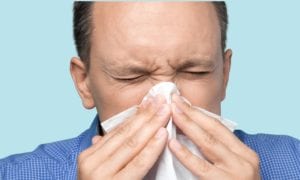Written by Jessica Patella, ND. Of the sixty-eight participating subjects with chronic sinusitis, those who used Nigella sativa spray for eight weeks significantly improved their symptoms compared to the placebo group.
 Chronic rhinosinusitis is a medical condition where the sinuses remain inflamed for 12-weeks or more 1,2. The symptoms include nasal blockage, nasal discharge (often thick & discolored), facial pain, facial pressure, loss of smell, and cough 1,2. An estimated 26.9 million people are diagnosed each year with chronic sinusitis in the United States 1,3. Recent research found 2 puffs per day of Nigella sativa, an herbal medicine significantly improved symptoms in participants with chronic sinusitis 1.
Chronic rhinosinusitis is a medical condition where the sinuses remain inflamed for 12-weeks or more 1,2. The symptoms include nasal blockage, nasal discharge (often thick & discolored), facial pain, facial pressure, loss of smell, and cough 1,2. An estimated 26.9 million people are diagnosed each year with chronic sinusitis in the United States 1,3. Recent research found 2 puffs per day of Nigella sativa, an herbal medicine significantly improved symptoms in participants with chronic sinusitis 1.
There are two main forms of chronic sinusitis, one with nasal polyps and the other without nasal polyps 4. Typical medical treatments for both types of chronic sinusitis include topical steroids, oral steroids, saline irrigation, antibiotics and surgery 1,5. Although, due to the multiple negative side effects of steroid treatments, many look for herbal or alternative treatments. One of the herbal options is Nigella sativa, also known as, Black Cumin or black seed. It is traditionally used for asthma, bronchitis, diabetes, eczema and fever 1.
A total of 65 participants with chronic sinusitis but without nasal polyps, were randomly divided into two groups, the Nigella sativa group (19 men, 12 women, avg. age 44.12 +/- 13.03 years) and the placebo group (18 men, 16 women, avg. age 45.50 +/- 12.57 years). The Nigella sativa group received 2 puffs/day of 1g/day N. sativa and the placebo group received 2 puffs/day of 0.65% saline spray, for a total of 8-weeks 1.
After 8-weeks of treatment both groups showed improvement, but there was a significant difference between the intervention group and the placebo group. The following are the results in the N. sativa herbal nasal spray group:
| Before intervention | After 8-weeks | Significance compared to placebo | |
|---|---|---|---|
| Lund-McKay score | 5.80 +/- 1.62 | 2.93 +/- 1.15 | p<0.001 |
| Modified Lund Kennedy | 3.64 +/- 1.47 | 1.54 +/- 0.92 | p<0.001 |
| SNOT-22 score | 27.25 +/- 8.05 | 14.87 +/- 5.01 | p<0.001 |
The Lund-McKay score is based on a CT scan of the sinuses, The Modified Lund Kennedy score is based on an endoscopic evaluation by the physician and the SNOT-22 score is a 22 question questionnaire based on outcome measures. Significant improvement was shown in all these measures with the herbal N. sativa nasal spray and no adverse side effects were reported 1.
In conclusion, N. sativa nasal spray is effective at reducing symptoms and shows objective measures of improvement for chronic rhinosinusitis 1. This was the first study to look at the effects of N. sativa nasal spray in non-polyp chronic rhinosinusitis 1. The researchers suggested future research comparing N. sativa nasal spray with steroid nasal spray 1.
Source: Rezaeian, Ahmad, and Sanaz Amoushahi Khouzani. “Effect of Nigella sativa Nasal Spray on the Treatment of Chronic Rhinosinusitis Without a Nasal Polyp.” Allergy & Rhinology 9 (2018): 2152656718800059.
© The Author(s) 2018
Posted December 10, 2018.
References:
- Rezaeian A, Amoushahi Khouzani S. Effect of Nigella sativa Nasal Spray on the Treatment of Chronic Rhinosinusitis Without a Nasal Polyp. Allergy & Rhinology. 2018;9:2152656718800059.
- Clinic M. Chronic Sinusitis. 2018; Overivew of chronic sinusitis. Available at: https://www.mayoclinic.org/diseases-conditions/chronic-sinusitis/symptoms-causes/syc-20351661. Accessed December 5, 2018.
- Prevention CfDCa. Chronic Sinusitis. 2017; Overview of chronic sinusitis. Available at: https://www.cdc.gov/nchs/fastats/sinuses.htm. Accessed December 5, 2018.
- Chong LY, Head K, Hopkins C, Philpott C, Schilder AG, Burton MJ. Intranasal steroids versus placebo or no intervention for chronic rhinosinusitis. The Cochrane Library. 2016.
- Kalish LH, Arendts G, Sacks R, Craig JC. Topical steroids in chronic rhinosinusitis without polyps: a systematic review and meta-analysis. Otolaryngology-Head and Neck Surgery. 2009;141(6):674-683.

